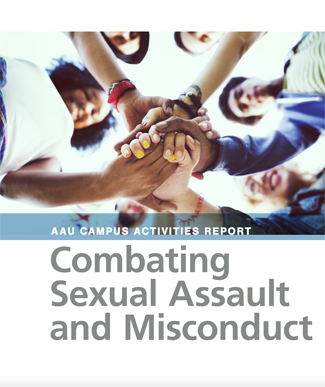
Vanderbilt’s efforts to educate incoming students about sexual assault prevention, and to help all students better understand how the university responds to and investigates reports of sexual misconduct, are mentioned in a new report released Wednesday, April 26, by the Association of American Universities.
“Keeping each and every member of our Vanderbilt community safe is a top priority. The AAU’s report provides valuable insight for the higher education community and beyond about the steps universities are taking to put an end to this serious problem,” Chancellor Nicholas S. Zeppos said. “We are committed to playing a leadership role in preventing sexual assault and sexual misconduct, to providing resources for support, and to continuing to improve how we handle incidents that are reported to the university.”
The report, which focuses on the actions being taken by AAU member universities to prevent sexual assault and sexual misconduct, is a follow-up to climate surveys conducted at the universities to gain a better idea of students’ views, knowledge and experience regarding sexual assault, as well as their awareness of prevention and support services available on campus.
Based on responses from 55 member universities, the report provides a look at the institutions’ efforts to develop and enhance programs to assist victims, and to use climate survey data to help target their efforts. Nearly all the universities reported increasing personnel, funding and other resources over the last three academic years devoted to victim support, student training and faculty and staff training.
To inform its prevention and support efforts, Vanderbilt conducted its inaugural Campus Climate Survey on Sexual Assault in spring 2015. The university plans to conduct follow-up surveys every three years to allow time for new and enhanced measures to have some impact.
“Having the necessary information and resources to foster a campus culture in which our community members are knowledgeable about how to prevent sexual assault and sexual misconduct, and how to support those who have experienced it, is essential to providing the university experience our students need and deserve,” Provost and Vice Chancellor for Academic Affairs Susan R. Wente said.
The university publicly shared the 2015 survey results in the hope that all members of the Vanderbilt community would review the results to gain further insight into the role all community members can play in maintaining a safe campus environment.
Vanderbilt’s program “Haven – Understanding Sexual Assault,” an online sexual assault prevention module that is required of all incoming students – first-year, transfer, graduate and professional –is specifically mentioned in the new AAU report as an example of the priority universities across the country are placing on prevention. In addition to prevention efforts, universities are continually working to improve victim support and the processes for adjudicating complaints. Vanderbilt’s program that introduces first-year students in their first two weeks on campus to university resources, reporting options, available safety measures, bystander intervention and risk reduction is also mentioned in the report.
In addition to these efforts, there are numerous other programs at Vanderbilt designed to prevent sexual misconduct and address the related issue of alcohol and drug abuse. The university’s programs include The Escalation Workshop on relationship violence, AlcoholEdu and Green Dot bystander intervention training. A number of individual departments, including Vanderbilt’s Title IX office and its Project Safe Center for Sexual Misconduct Prevention and Support, and student organizations also provide regular and ongoing programming around prevention and support.
In 2014, Vanderbilt expanded what had been the Women’s Center’s longstanding Project Safe program into the free-standing Project Safe Center. The center is a hub for information about prevention and support services on campus. In 2016, the university took another step in fostering a culture that encourages reporting of incidents by making the center a limited confidential resource for students. If requested, center staff also can provide referrals to the other offices on campus that assist with responding to reports of sexual assault and sexual misconduct.
Vanderbilt’s Title IX office, Equal Opportunity, Affirmative Action and Disability Services (EAD), has responsibility for investigating reports of sexual misconduct to determine if university policies have been violated. A sample timeline and one-page flow chart of the investigative process created by EAD’s Title IX Coordinator and investigative staff to help students better understand the university process for investigating reports of sexual misconduct is also given by AAU as an example of efforts universities are taking to provide student support.
Vanderbilt provides regular and ongoing training to faculty and staff, as well as to university leadership. Training on nondiscrimination laws and policies, including those covering sexual misconduct, are part of new faculty and staff orientation. The Center for Student Wellbeing and the Project Safe Center offer resources for learning how to respond to students in distress and the university’s Title IX office provides training on Title IX, sexual misconduct and reporting obligations. A seminar for managers and supervisors with hiring responsibilities on subjects including discrimination, harassment and retaliation is also offered through the Title IX office.
Additionally, staff in the offices that address these issues are trained on an ongoing basis on issues related to sexual harassment, sexual misconduct, and intimate partner violence, and in conducting investigations in a manner that protects the well-being and safety of the complainant, the respondent and the university community. University police receive training as well.